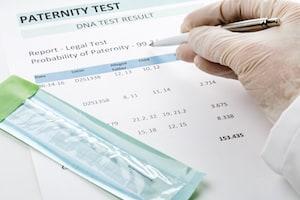& Family Law for More Than 25 Years.
A Firm Focused on Divorce and Family Law.

From the Anna Nicole Smith saga to less famous cases, the subject of paternity testing has been in the news a lot lately. While most of us understand the concept behind such tests, few of us have taken the time to learn more about this important subject?
In its simplest terms, a paternity test is a DNA analysis which is designed to determine whether a particular man is the father of a particular child.
There are many reasons why a individual would want or need a paternity test. The reasons for obtaining such a test are as varied as the individual circumstances, but some of the most common reasons include:
Compared to many other medical tests, the collection process for a paternity test is quite simple and quite painless. The most common method is to take a swab of the cells inside the cheek. This collection method is quite effective, since the cells containing the DNA that will be tested are found throughout the body.
After the swabbing is completed, the swabs are placed in a container for testing. The testing can take place either in a local laboratory or through a mail order facility. In the case of court ordered testing the court will typically determine which laboratory is to be used.
After the samples are received at the laboratory, the testing can begin. In order to have a valid test the DNA of the mother, the child and the alleged father or fathers must be present.
The most common method used to determine paternity is known as the polymerase chain reaction, or PCR, test. In this test, the pure DNA is isolated from the sample by removing the proteins and other materials found within the cells.
After the pure DNA has been isolated, the laboratory will examine the specific locations, or loci, of each sample. Every individual carries two copies of each chromosome, and will therefore have two readings for each of the loci being tested. After the testing has been completed, the loci readings for parent and alleged father are carefully compared.
In order to establish paternity one of the child’s numbers must match that of his or her mother, while the other number will match that of the true father.
If the numbers are a match, the next step is to perform the paternity index calculation. This is a calculation of how frequently the same match occurs in a particular population. This in turn represents the likelihood that the subject of the test is the true biological father based on the results of the test. Most laboratories will test several loci in order to establish paternity; the more loci tested the greater the accuracy. When looking for a laboratory expert recommend seeking one that tests at least 16 different loci in their paternity tests.
It is important to choose a laboratory that can provide a 99.99% probability that the subject is the father in the event of a positive test. Not only will this result be more likely to stand up in court, but it will provide much needed piece of mind and protection against false positives.
Peter Van Aulen has over 25 years’ experience in the areas of paternity, child custody, divorce, and family law. He is certified by the New Jersey Supreme Court as a Matrimonial Attorney. Not only he has over twenty-five (25) years of practice experience he teaches continuing legal education seminars to lawyers in areas of divorce and family law. If you have a question concerning paternity, call the Law Offices of Peter Van Aulen at (201) 845-7400 for initial consultation.